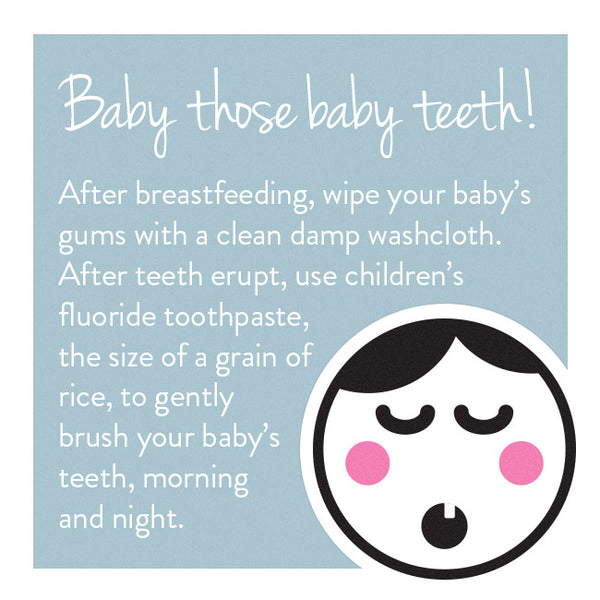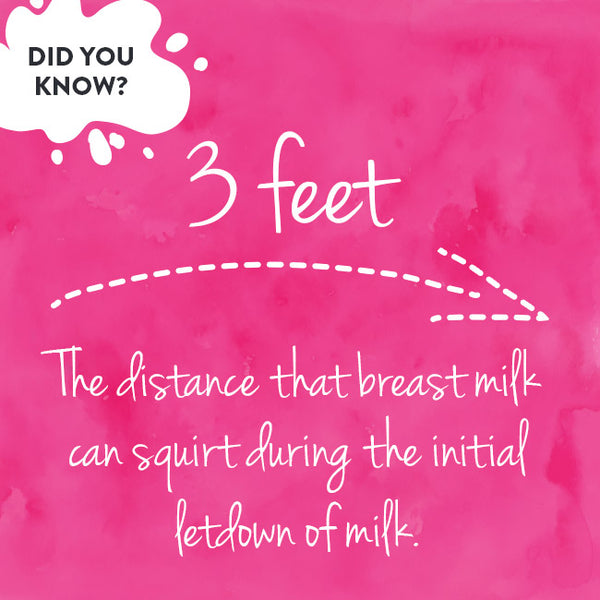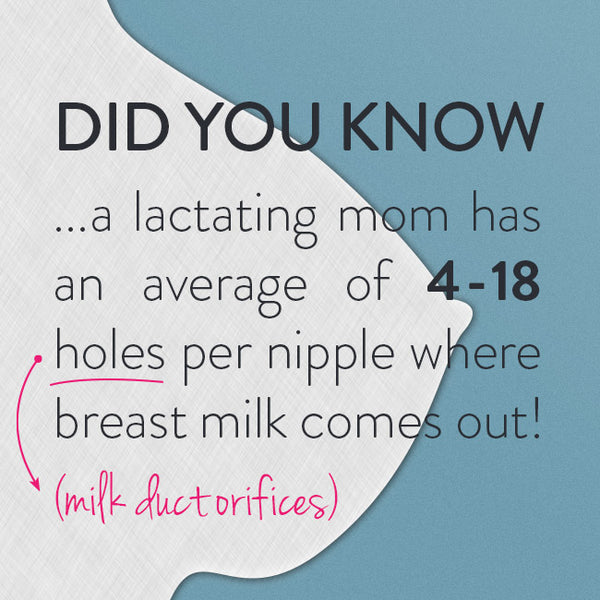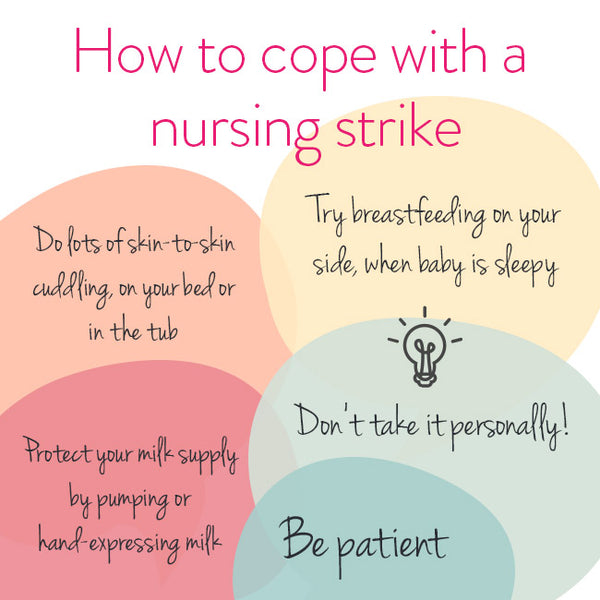How to deal with a nursing strike, biting or a distracted baby
Do you know what to do if your baby bites while breastfeeding, gets distracted while breastfeeding, or goes on a nursing strike? These are three fairly common breastfeeding challenges that may show up when your baby is a little bit older, starting around four months and up. Check out these tips from experts and real-life moms to find out how to deal, adapt and keep your breastfeeding relationship strong.
“My baby bites while breastfeeding!”
Those wee teeth poking through your baby’s gummy smile are pretty adorable. Not so adorable: when your baby bites while breastfeeding. It hurts, and it’s shocking and upsetting, especially the first time it happens, so shrieking “OW!” is a normal reaction. “Don’t beat yourself up if you have a strong response,” says Mary Oliver Humke, an International Board Certified Lactation Consultant (IBCLC) in Louisville, Kentucky, who blogs at her company site, Blossom Breastfeeding.
The typical age range for biting is when the teeth first start to come in, around five or six months of age, and then again around eight to ten months when baby is transitioning to more solid food and a different nap schedule. Toddlers can also bite, because developmentally this is when they’re exploring the world with their mouths, says Deirdre McLary, an IBCLC, doula and childbirth educator in Nyack, New York who works with moms through her company, Momma Arts. “Biting usually happens around the very beginning or very end of the breastfeeding session,” she says. “If milk is flowing and the baby is swallowing, physiologically they can’t bite. So listen, and when you don’t hear swallowing, it’s time to end the feeding.” Use your little finger at the corner of baby’s mouth to break the suction on your breast.
And if your baby or toddler does bite? You may have heard to flick baby’s cheek or nose with your finger, but neither Humke nor McLary recommends this approach. Instead, say something short and firm like “No! Bite hurts mama!” in a stern voice with a stern expression. Another approach is to hug baby closer to the breast for a few seconds, so she opens her mouth to breathe and releases the nipple. “The breastfeeding session is always over after a bite,” says Humke. “Put baby down and give her something she can chew on, like a cold wet washcloth or a frozen ring. Moms worry that being stern will hurt baby’s feelings but it’s important to break that association between biting and breastfeeding or it can become a habit.” She adds that you can praise baby when she’s being gentle, by giving her a big smile and saying “that’s good.”

Source:
The American Dental Association

Source:
Clinical Lactation
“My baby is totally distracted while breastfeeding!”
The first time your baby pops off mid-feed and breast milk sprays everywhere…well, that’s one of those unofficial milestones. The distracted baby phase can show up around the four to six month mark when baby gets more aware and curious about the world, and then again around the eight- to ten-month mark and beyond.

Source:
Breastfeeding Basics

Source:
Medela - Anatomy of the Lactating Breast
Some breastfeeding tips to try:
- Head to a quiet, darkened space if you can.
- Try breastfeeding while wearing your baby in a sling, or with a light cover over baby to block out distractions.
- Put away your phone or book and just hang out with your baby during a breastfeeding session, so he focuses on you, says Humke.
- On the other hand, you can try avoiding eye contact. “Some babies will lock eyes with mom, smile and giggle and that starts the distraction,” says McLary.
- Get a busy box. If you’ve also got an active toddler with you while you’re trying to breastfeed your baby, create a special bin or basket that has toddler-friendly toys or items that only come out when mama is breastfeeding.
- Some moms have success with a “nursing necklace” made of chunky beads or a shirt with an embellished neckline that baby can play with while breastfeeding.
Melissa Lawrence, a New York mom of five who vlogs at her site CloudMom points out that the way your baby breastfeeds might be changing. “Now that your baby is a little older, she gets more efficient in how she eats,” she says. “Before it might have take 30 or 45 minutes, but now you might be able to complete the whole process in 10 minutes. So it’s not like you’re going to be behind closed doors for hours at a time.”
“My baby suddenly stopped breastfeeding! Is that a nursing strike?”
“A nursing strike is a swift, dramatic and unexpected change in breastfeeding behavior,” says McLary. “The baby changes his breastfeeding rhythm to the point he’s not feeding at all, or only morning and evening.” It can happen at any age, but may appear more often around the introduction of solids or another milestone like crawling. Moms may mistake this for self-weaning, but that’s not the case, says Humke. A nursing strike typically lasts two to four days, but can go on longer.
Why does it happen? There could be a variety of factors at work.
- A physical cause, such as an ear infection, stuffy nose, thrush or teething pain, which means baby associates breastfeeding with being uncomfortable.
- A response to a different environment. Some babies are sensitive to a change in mom’s deodorant, lotion or laundry detergent.
- Exposure to something stressful during breastfeeding. “I had a client who was breastfeeding when a very loud tornado warning alarm went off, and that started a nursing strike for her baby,” says Humke. Mom shouting at a pet, or yelping in pain if baby bites, can also be a factor.
Check in with a lactation consultant and/or your health care provider to see if you can figure out what’s happening. The two most important things to remember about a nursing strike, says Humke, are to protect your breast milk supply and feed the baby. Pump or hand express breast milk to keep your supply flowing. If your baby is six months or older, introduce breast milk with a soft cup or spoon.

Julie S., a Houston, Texas mom of one who blogs at FabWorkingMomLife had some early struggles with breastfeeding that meant her supply was on the low side when her son was four months old and went “on strike.” “He screamed if I even tried to hold him in a breastfeeding position,” she remembers. “His appetite was incredible and he would get angry when the milk ran out and he was still hungry. Maybe it was a growth spurt.”
The strike lasted about a week, and during that time she supplemented with formula and breast milk, cuddled him to her bare chest without attempting to latch, and pumped to keep her supply. “Babies do unpredictable things, and we just have adapt the best we can,” she says. “The most important thing is to have support from your family and peers and take care of yourself and the baby.”
And really, those wise words apply to quite a few parenting dilemmas, not just a biting baby, a distracted baby or a nursing strike…hang in there, mamas!













